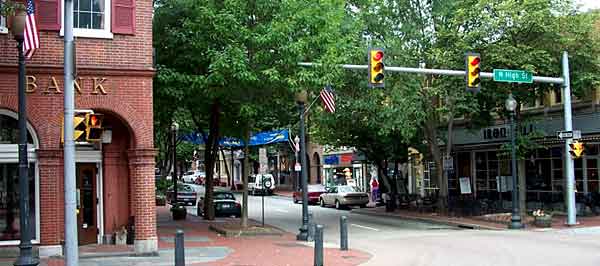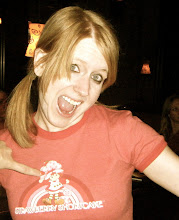
The Chester County Book & Music Company doesn’t have a Starbucks in it. It doesn’t offer slashed prices or the convenience of shopping at home. Then again, it doesn't need to. With its 260,00 book titles and 50,000 music recordings, this store instead attracts its customers on the quality of its product and the knowledge of its staff.
The Chester County Book and Music Company, after all, is not a tiny hole-in-the wall shop. Instead, it covers over 38,000 square feet and is one of the largest independently owned bookstores in the country. Joseph Drabyak, a store associate and the president of the New Atlantic Independent Booksellers Association, does not get upset about those who prefer Barnes & Noble or Borders to his store but instead expresses concern at the growing power of corporate giants like Wal-Mart, Target, and Amzaon.com.
Although Drabyak criticizes Barnes & Noble for the lack of diversity in their product and the fact that they make decisions for individual stores at the corporate level, he does not entirely discredit the chain.
"At least they’re booksellers,” he says.
On the other hand, Drabyak seethes about Wal-Mart, describing the chain as “predatory.” He uses the example of Vince Flynn, a self-published thriller writer, to prove his point. Independent booksellers first discovered Flynn, read Advanced Reader Copies of his books and promoted him at their local stores. Flynn’s popularity soared, and Wal-Mart and other similar stores sold his books at a significantly discounted price. This took sales away from the independent shops who worked so hard for Flynn in the first place.
“Wal-Mart has done no work in terms of nurturing or cultivating these writers,” says Drabyak. “The crime they are committing is almost a theft of services.”
Drabyak, who previously ran an independent video store, feels passionately about all local businesses and independently owned stores, not just The Chester County Book & Music Company. He points out a few organizations that also champion this cause including Indiebound, AMIBA (The American Independent Business Alliance), and BALLE (the Business Alliance for Local Living Economies).
"It just makes more sense to shop at your local stores," Drabyak says. "You're giving money back to the community, and you're providing jobs for people in that community."
Drabyak cites The Andersonville Study to prove his point. This study, conducted in 2004, points out that for every one hundred dollars spent locally, $68 remains in that community, as opposed to $43 spent at a chain store. If a shopper would choose to use Amazon.com, the local community would not even see a dime.
“One of the big issues we’ve been championing is the state sales tax,” Drabyak explains. People who buy their books more cheaply through web sites such as Amazon.com do not pay sales tax to the state of Pennsylvania. Therefore, the local tax base suffers. Drabyak finds this particularly frustrating and points out that Amazon does not read or research the 280,000 books that are published each year.
“Amazon uses other people to filter through all of these books,” says Drabyak, referring to the user comments that promotes Amazon’s product.
Lisa Glah-Donahue, a longtime resident of the West Chester area, makes a specific point of shopping locally whenever possible. As a co-owner of her own business, Farside and Cash, she claims to appreciate the effort and hopes that are invested in these shops.
“I believe that the small shops in a town like West Chester are crucial to maintaining its historical small town charm,” she explains. “They contribute to a sense of community, and I enjoy seeing them succeed.”
This sense of community is another reason that Drabyak believes so strongly in shopping locally. In West Chester, The Chester County Running Store encourages shoppers to participate in local races, and The Mad Platter advertises local concerts and music events. These small stores offer jobs to members of the community and even work with local schools and youth organizations as reference and resource centers.
"Don't get me wrong," Drabyak says, "I'm all for globalization, but when it comes to the common market, I'd rather be offering a job to someone from Downingtown than New Dehli".
He also explains how local stores offer a more unique product than the competition. Whereas the corporate stores such as Wal-Mart and Barnes & Noble must be worried about “offending” their customers, the independently owned shops do not have to respond to these pressure groups. A local store can promote local interests; for example, due to its proximity to Valley Forge and the Brandywine, West Chester’s residents might demonstrate more interest in Revolutionary War History than those from a small town in California.
Drabyak also shows how local businesses even assist the environment by encouraging less packaging and transportation costs. Tom Campbell of the Regulator Book Shop has actually posted a video that details this phenomenon. Campbell describes how purchasing from an online store uses six times more packaging and puts three times as many trucks on the road.
"You might save a little money [by using Amazon] short term," Drabyak finishes, "but in the long run, you're doing yourself and your community a huge disservice."
Luckily, West Chester residents seem to see the value in shopping in their own borough as they flock to stores like Obvi, Jane Chalfant, and the Chester County Book and Music Company. And with the continued work of individuals like Joe Drabyak and the support of customers like Lisa Glah-Donahue, West Chester will thrive by offering the unique shopping experience that separates it from the corporate chains of the suburbs.


No comments:
Post a Comment